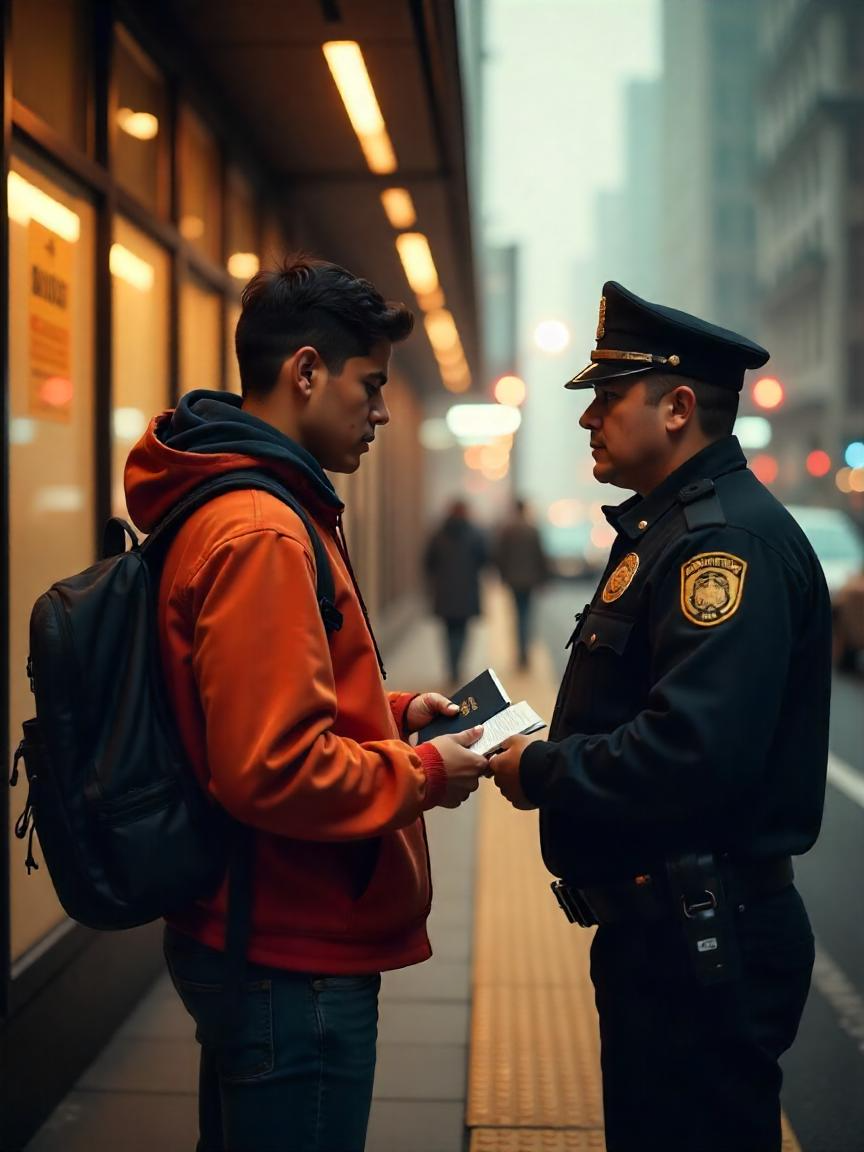
How to Adjust Your Status if You Are Already in the U.S.
For many immigrants, the United States represents opportunity, stability, and the promise of a brighter future. If you are already living in the U.S. and hope to remain here permanently, you may be able to do so without leaving the country through a process known as Adjustment of Status.
Adjustment of Status allows eligible non-citizens to apply for a Green Card from inside the United States, without having to return to their home country for visa processing. While this pathway is convenient and often less stressful, it includes strict eligibility requirements and a detailed application process.
What Is an Adjustment of Status?
Adjustment of Status (AOS) is the legal process that allows qualifying individuals already in the U.S. to transition from a temporary immigration status to lawful permanent residency (Green Card holder). This process is handled by U.S. Citizenship and Immigration Services (USCIS) and is available to individuals who qualify through family, employment, humanitarian programs, or other special categories.
Who May Apply for Adjustment of Status?
You may be eligible to adjust your status in the United States if you fall into one of the following categories:
1. Family-Based Eligibility
You may qualify if you are an immediate relative of a U.S. citizen, such as:
- A spouse
- An unmarried child under 21
- A parent of a U.S. citizen who is at least 21
Certain other family preference categories may also qualify when a visa number becomes available.
2. Employment-Based Eligibility
You may qualify if:
- You have an approved employment-based immigrant petition (Form I-140)
- A visa number is available in your category
3. Humanitarian Programs
Adjustment of Status may be available for individuals under programs such as:
- Refugee or asylee status
- VAWA self-petitioners (victims of domestic violence)
- U or T visa holders (victims of crimes or trafficking)
4. Diversity Visa (Green Card Lottery) Winners
Lottery winners who are already lawfully in the U.S. may apply if their visa number is current.
Who Is NOT Eligible for Adjustment of Status?
You may not qualify if you:
- Entered the U.S. without inspection (unless covered by specific exceptions such as INA 245(i))
- Overstayed your visa or violated its terms (unless you are an immediate relative of a U.S. citizen)
- Are currently in removal (deportation) proceedings without special eligibility
- Have certain criminal convictions
- Are inadmissible under immigration law without a waiver
Before applying, it is crucial to confirm eligibility with an immigration attorney, as mistakes can lead to denials or even removal proceedings.
How to Adjust Your Status in the U.S.
Here is the step-by-step process:
1. Confirm Your Eligibility
Verify that you qualify under one of the family, employment, humanitarian, or lottery categories and that a visa number is available.
2. Submit the Required Forms
The main application form is:
- Form I-485, Application to Register Permanent Residence or Adjust Status
Depending on your case, you may need to file additional forms, such as:
- Form I-130 (family petition) or Form I-140 (employment petition)
- Form I-864, Affidavit of Support
- Form I-693, Medical Examination Report
- Form I-765, Work Authorization
- Form I-131, Advance Parole (travel permit)
3. Attend Biometrics Appointment
USCIS will collect your fingerprints, photo, and signature for background checks.
4. Attend the USCIS Interview
A USCIS officer will review your documents, confirm your eligibility, and ask questions about your background and application.
5. Receive a Decision
If approved, you will receive your Green Card by mail.
If denied, USCIS will provide an explanation and any available next steps.
Documents You May Need
Common documents include:
- Passport and valid visa
- I-94 Arrival/Departure Record
- Birth certificate
- Proof of lawful entry
- Marriage certificate (if applicable)
- Medical exam results (sealed by the doctor)
- Financial documents (tax returns, pay stubs, bank statements)
Common Mistakes to Avoid
Many Adjustment of Status cases are delayed or denied due to avoidable errors. Be careful to avoid:
- Filing without confirming eligibility
- Submitting incomplete or inconsistent documents
- Traveling outside the U.S. without approved Advance Parole
- Missing a biometrics or interview appointment
- Failing to respond to USCIS Requests for Evidence (RFEs)
Final Thoughts on How to Adjust Your Status if You Are Already in the U.S.
Adjustment of Status is one of the most effective ways to become a lawful permanent resident while remaining in the United States. However, the process requires careful preparation, accurate documentation, and a solid understanding of immigration law.
At Mokolo Law Firm, we help clients determine eligibility, prepare strong applications, avoid common pitfalls, and navigate complex immigration histories. If you are considering applying for Adjustment of Status or are unsure whether you qualify, our experienced immigration team is ready to guide you every step of the way.
Contact Mokolo Law Firm today to schedule a consultation and take the next step toward securing your future in the United States.

What Are the Rights of Non-Citizens in Fort Bend County, Texas?
Fort Bend County, located in the heart of Texas, is one of the most diverse and fast-growing counties in the United States. With its rich history dating back to 1837 and vibrant communities shaped by people from all over the world, Fort Bend has become a hub for immigrants seeking better opportunities and a safe place to call home.
However, for many non-citizens, including immigrants, lawful permanent residents, refugees, asylum seekers, and undocumented individuals, the question often arises: “What are my rights here in Fort Bend?”
The good news is that, under both U.S. federal law and Texas state law, non-citizens are entitled to several fundamental rights and legal protections, regardless of their immigration status. These rights ensure fair treatment, access to justice, and protection from discrimination.
At Mokolo Law Firm, we are committed to defending and educating non-citizens in Fort Bend and throughout Texas about their legal rights. Understanding these rights can make a world of difference, from protecting your job to accessing public services or defending yourself in legal proceedings.
Let’s explore what rights non-citizens have in Fort Bend County and how local policies and resources can help you safeguard those rights.
1. Legal Protections for Non-Citizens
Under the U.S. Constitution, non-citizens are granted key legal protections that apply to everyone within the United States, not just U.S. citizens.
Due Process and Equal Protection (14th Amendment)
The 14th Amendment guarantees that “no person shall be deprived of life, liberty, or property, without due process of law.”
This means that non-citizens cannot be detained, deported, or punished without a fair legal process. Regardless of immigration status, everyone in Fort Bend has the right to a fair hearing and legal representation.
Protection from Unlawful Discrimination
Non-citizens are protected under various federal and state civil rights laws, including the Civil Rights Act and the Fair Housing Act, which prohibit discrimination based on race, national origin, religion, or immigration status in:
- Employment
- Housing and rental agreements
- Access to public facilities and government programs
At Mokolo Law Firm, we regularly assist clients facing discrimination or unfair treatment due to their immigration status, helping them assert their rights and seek justice under the law.
2. Access to Essential Services
Even without U.S. citizenship, many non-citizens in Fort Bend are entitled to access essential public services. While some benefits depend on immigration status, others are available to all residents, including:
- Public Education: Every child, regardless of immigration status, has the right to attend public school in Texas (as established by the Supreme Court in Plyler v. Doe, 1982).
- Emergency Medical Care: Hospitals and clinics must provide emergency care to all individuals, regardless of citizenship or ability to pay.
- Legal Assistance: Non-citizens can access nonprofit legal aid services for immigration, housing, or employment matters.
- Public Safety: Non-citizens can and should seek help from law enforcement if they are victims of crime or abuse. Local police are prohibited from denying assistance based on immigration status.
These protections exist to ensure that everyone in Fort Bend can live, learn, and work safely.
3. Protection from Discrimination and Exploitation
Non-citizens have the right to be free from discrimination and exploitation in workplaces, housing, and community spaces. Employers, landlords, and service providers cannot legally deny opportunities or mistreat someone because of their immigration status or national origin.
For example:
- Employers must pay fair wages and provide safe working conditions.
- Landlords cannot evict or refuse housing based on immigration status.
- Public services such as schools and hospitals cannot discriminate against immigrants.
If you experience discrimination or exploitation in Fort Bend County, Mokolo Law Firm can help you file complaints, report violations, and pursue justice through the appropriate legal channels.
4. Rights of Specific Groups of Non-Citizens
Not all non-citizens fall under the same legal category , and each group may have distinct rights and protections under U.S. immigration law.
Refugees and Asylum Seekers
Refugees and asylum seekers fleeing persecution are protected under both U.S. federal law and international human rights law. They have the right to apply for asylum, receive a fair hearing, and remain in the U.S. while their case is being reviewed.
Green Card Holders (Permanent Residents)
Lawful permanent residents enjoy most of the same rights as citizens, including the right to live, work, and own property. They are also protected by constitutional rights and may only lose their status through a formal deportation process.
Undocumented Immigrants
While undocumented immigrants do not have full citizenship privileges, they are still entitled to basic human rights such as due process, access to education for their children, protection from violence, and freedom from unlawful search and seizure.
DACA Recipients (Dreamers)
Individuals protected under the Deferred Action for Childhood Arrivals (DACA) program can lawfully live and work in the U.S. temporarily, and they are protected from deportation while their DACA status remains valid.
5. Local Context: Non-Citizen Rights in Fort Bend County
While the federal government sets the foundation for immigrant rights, local policies and organizations in Fort Bend also play a major role in protecting non-citizens and supporting their integration.
Local Legal Resources
Several legal aid organizations in and around Fort Bend County provide free or low-cost legal services to immigrants. These organizations can help with:
- Immigration applications (Green Cards, visas, asylum, etc.)
- Deportation defense
- Work authorization and documentation
- Family reunification and citizenship applications
Community Advocacy Groups
Fort Bend is home to several community advocacy groups that support immigrants through education, resources, and cultural programs. These groups ensure that non-citizens have access to information and help navigating life in Texas.
Mokolo Law Firm partners with many of these community organizations to offer legal clinics, workshops, and personalized consultations for immigrants and non-citizens across Fort Bend County.
Final Thoughts on What Are the Rights of Non-Citizens in Fort Bend County, Texas?
Non-citizens are a vital part of Fort Bend County’s rich and diverse community. From contributing to the economy to building families and neighborhoods, immigrants continue to strengthen the social fabric of Texas. Yet, misinformation and fear often prevent them from asserting their rights.
Contact Mokolo Law Firm Today
At Mokolo Law Firm, we believe that knowledge is protection. Every non-citizen, whether documented or not, deserves to understand their legal rights and access justice without fear of discrimination or retaliation.
If you’re a non-citizen living in Fort Bend County and facing legal challenges, uncertainty about your status, or discrimination, our experienced immigration attorneys are here to help. We provide compassionate, strategic legal guidance to protect your rights and secure your future. Let us help you understand your rights and protect your legal status in Fort Bend County.

Your Immigration Rights in Texas
Maneuvering the U.S. immigration law is challenging. If you are living in Texas (or considering doing so), it’s important to know your rights, whether you are a lawful immigrant, undocumented, or somewhere in between. This blog aims to explain your key rights, possible protections, and practical steps you should take in a way that is clear and accessible.
1. Federal Supremacy & Texas Law
First, a crucial legal principle: immigration enforcement is primarily a federal responsibility, not a state-level matter. The U.S. Congress enacts immigration statutes, and federal agencies (such as U.S. Citizenship and Immigration Services / USCIS, Department of Homeland Security / DHS, and Immigration and Customs Enforcement / ICE) administer and enforce those laws.
In recent years, Texas attempted to pass laws (e.g. Texas Senate Bill 4) that would empower state or local officials to arrest or deport migrants suspected of entering illegally. However, the courts have blocked enforcement of many of these laws, ruling that they conflict with federal authority. Therefore, while local laws may attempt to influence immigration enforcement, your rights are ultimately determined by federal law.
2. The Right to Remain Silent & Avoid Self-Incrimination
If you are stopped by law enforcement (including immigration authorities), you have the right to remain silent. You are not required to answer questions about your immigration status. This is grounded in the Fifth Amendment’s protection against self-incrimination.
- You can politely decline to answer immigration-status questions.
- You may ask to speak to a lawyer before responding.
- Do not lie to officers, but also do not volunteer information unnecessarily.
It is often wise to have a “Know Your Rights” card or document prepared, especially if your first language is not English.
@legallyuzo They said “show your work” – so we dropped a whole stack of proof. 📁✅ From green cards to permanent residency, we’ve been delivering results for real. ImmigrationLaw GreenCardApproved ReceiptsReady #MokoloLaw Learn more: https://www.mokololaw.com/practice/immigration-law/
♬ original sound – Legallyuzo – Legallyuzo
3. Protection from Unlawful Searches & Seizures
Fourth Amendment protections apply to everyone in the U.S., regardless of immigration status. That means:
- Officers generally must have a warrant or probable cause to enter your home.
- They cannot forcibly enter your home without justification (unless exigent circumstances exist).
- If stopped in public, they must have reasonable suspicion that you committed a crime or, in some immigration contexts, that you are violating immigration law, to detain you.
If law enforcement detains you or searches your property unlawfully, that evidence might be challenged in court.
4. Rights in Immigration Proceedings
If you are placed in removal (deportation) proceedings, you have certain statutory and constitutional rights:
a. Right to a hearing & representation
- You have the right to a hearing before an immigration judge, to contest removal orders.
- You have the right to an attorney (at your own expense). If you cannot afford one, the court will not appoint a free attorney for you, but you may qualify for pro bono representation or legal aid organizations.
b. Relief or defenses from removal
Depending on your situation, you may be eligible for relief from removal, such as:
- Asylum — if you fear persecution in your home country based on race, religion, nationality, political opinion, or membership in a particular social group.
- Withholding of removal or Convention Against Torture (CAT) protections (for those unlikely to face persecution but still unsafe).
- Cancellation of removal — in certain cases you may request cancellation if you meet continuous presence, moral character, and other criteria.
- Adjustment of status — if you are eligible to become a lawful permanent resident (green card holder), you might be able to apply without leaving the U.S.
- Voluntary departure — an option to leave voluntarily within a time frame rather than endure a forced removal.
c. Appeal rights
If an immigration judge rules against you, you may be able to appeal to the Board of Immigration Appeals (BIA), and further to federal court, depending on the case.
5. Rights Relating to Detention
- If you are detained by ICE (or other federal immigration custody), you have the right to challenge your detention and request a bond hearing (release under conditions) in many cases.
- The law requires that detention conditions meet basic constitutional standards (adequate medical care, safety, etc.).
- Family detention and detention of children is more tightly regulated, and courts have in many cases imposed protections and limits.
- For example, there is a detention facility in Texas called the “T. Don Hutto Residential Centre”, used for immigrant detention.
6. Rights to Work, Documents & Benefits (When Eligible)
If your immigration status allows, you may have rights to:
- Work authorization — Certain statuses (e.g. asylum, adjustment of status, some visas) permit you to apply for an Employment Authorization Document (EAD).
- Access to documents such as a Social Security number, state driver’s license, or identification (depending on state law).
- Access to certain public benefits (though eligibility is limited under federal law).
- Renewal or replacement of status documents — you have a right to apply to renew green cards, visas, or replace lost documents, subject to eligibility.
Always check current USCIS guidelines or consult with an attorney, because rules can change.
7. Protection from Discrimination & Retaliation
You have the right not to be discriminated against because of your immigration status, race, national origin, or religion, especially in contexts such as:
- Employment (if you are legally authorized to work).
- Housing (in many jurisdictions).
- Education and access to public services.
Additionally, you are protected from retaliation (for example, adverse actions by your employer) for asserting your rights legally.
8. Practical Steps You Should Take
- Consult a qualified immigration lawyer
Especially for removal proceedings, asylum, or status adjustment—mistakes can be costly or irreversible. - Document everything
Keep copies of your visa, I-94, receipts, notices from USCIS or ICE, and any correspondence you receive. - Know your deadlines
Immigration law has strict filing deadlines (e.g. for appeals or motions). - Be cautious with advice from non-lawyers
Fraudulent or unauthorized “notarios” may mislead you. Always verify credentials. - Prepare a family safety plan
If you are detained, your family should know who your lawyer is and how to access your records.
9. Recent Legal Developments in Texas
- In July 2025, a federal appeals court reaffirmed that Texas cannot enforce SB 4, a state law that would have allowed state authorities to arrest migrants for illegal entry.
- The court ruled that federal immigration law preempts conflicting state laws, reinforcing that states cannot unilaterally criminalize immigration violations.
- Advocacy groups in Texas also distribute “Know Your Rights” materials to immigrants, explaining how laws like SB 4 are being challenged and what protections still apply.
These developments matter: they help protect immigrants from overreach and underscore that federal authority remains the controlling power in immigration law.
Final Thought on Your Immigration Rights in Texas
Immigration law in Texas can feel uncertain, especially with shifting state policies and ongoing federal debates. But one thing remains constant—you have rights. Knowing those rights, exercising them wisely, and working with an experienced immigration attorney can make the difference between fear and security, or between removal and relief. At Mokolo Law Firm, we are committed to standing by immigrants at every step, ensuring their voices are heard and their rights are fully protected.

Thrown Back Into Deportation Proceedings? How to Fight Back with Removal Defense
Facing deportation even after previously winning relief can feel like being thrown back into the storm you thought was behind you. However, that doesn’t mean your options are gone. In Texas, when removal proceedings resume, you may still have legal tools to fight back, such as reopening cases, asserting cancellation of removal eligibility, or applying anew for relief based on changed circumstances. This guide helps you understand your rights and how Mokolo Law Firm can help defend your case and keep you here with your family.
Understanding Why Proceedings Can Restart
Removal (deportation) proceedings can resume if:
- Your prior relief was overturned on appeal
- New evidence emerges
- Filing deadlines were missed, or an improper waiver was granted
- An ICE detainer was placed after case closure
@legallyuzo They said “show your work” – so we dropped a whole stack of proof. 📁✅ From green cards to permanent residency, we’ve been delivering results for real. ImmigrationLaw GreenCardApproved ReceiptsReady #MokoloLaw Learn more: https://www.mokololaw.com/practice/immigration-law/
♬ original sound – Legallyuzo – Legallyuzo
Legal Strategies to Push Back
1. Motion to Reopen or Reconsider– If your case ended unfairly or with procedural errors, there may be a chance to revisit it.
2. Changed Circumstances– If you’ve built more substantial ties to the U.S. (e.g. new family, community service, employment), you may be eligible for “Cancellation of Removal” or other forms of relief.
3. Asylum / Withholding / CAT– Changed country conditions may allow new applications to avoid deportation to your home country.
4. Adjustment of Status– If your lawful status has materially changed (e.g. marriage to a U.S. citizen), you may now qualify for a green card.
Evidence to Gather
- Updated family, work, and community documents
- Medical records or proof of abuse or threats
- Character references (employers, clergy, employers)
- Country condition reports demonstrating worsening conditions in your home country
How a Law Firm Can Help
- Assess your history and immigration records
- File timely motions or applications grounded in Texas and federal immigration law
- Prepare compelling documentation and legal briefs
- Represent you at hearings or appeals

Final Thoughts on Thrown Back Into Deportation Proceedings? How to Fight Back with Removal Defense
Being placed back into deportation proceedings is daunting, but it doesn’t have to be the end. With the right legal strategy and strong evidence, you can fight to remain with your community and family. At Mokolo Law Firm, we believe every person has the right to a fair hearing and a chance at relief. If you’ve been returned to removal proceedings or believe you may be next, reach out to us immediately to explore your legal options and begin your defense today.

Green Card Interview Process in Texas
If you’re applying for a Green Card and living in Texas, the interview stage is a crucial milestone in your immigration journey. Whether your application is based on marriage, family sponsorship, employment, or asylum, the Green Card interview is where USCIS officers assess the authenticity of your application, determine your eligibility for permanent residency, and evaluate the legitimacy and completeness of your case.
The process can feel intimidating, but with the right preparation, it doesn’t have to be. Understanding what to expect, what to bring, and how to present your case can make all the difference between a smooth approval and an unexpected delay.
In this guide, we’ll walk you through everything you need to know about attending your Green Card interview at a Texas USCIS field office, from important documents and interview questions to post-interview outcomes and expert tips for success.
Green Card Interview Process in Texas
Venue of Interview in Texas
The Green Card interview is a formal step conducted by U.S. Citizenship and Immigration Services (USCIS) to verify your eligibility for permanent residency. Depending on your case type and location, the interview typically takes place at a USCIS field office in Texas (e.g., Houston, Dallas), unless waived under limited criteria such as minor children or illness. Applicants abroad may be interviewed at a U.S. embassy or consulate.
For marriage-based Green Card applicants, the officer will also assess whether your relationship is authentic and legally valid, ensuring it was not entered into solely to gain immigration benefits. Both the applicant and the petitioner (e.g., spouse) must attend. Interpreters and attorneys may also accompany you if allowed.
Document Requirements
- Appointment notice (Form I-485)
- Government-issued photo ID (passport, driver’s license)
- Complete copy of your I-485 application with supporting documents
- Original civil documents (birth, marriage certificates)
- Form I-693 sealed medical exam packet (required since Dec 2024)
- Evidence of bona fide relationship (joint bank/lease statements, photos, etc.) for marriage cases
- Employment verification letter and job offer documents for employment-based cases

Interview Process
The primary goal of the interview is to confirm the accuracy of the information you submitted in your application and to evaluate your eligibility under current immigration law. During the session, a USCIS officer will:
- Review your submitted documentation
- Verify your identity using photo ID and biometrics
- Ask questions about your background, immigration history, and employment or family ties
Approaching this interview well-prepared can make a critical difference in the outcome of your case.
Common Green Card Interview Questions
The Green Card interview typically includes a mix of personal, professional, legal, and relationship-related questions to verify your eligibility and the authenticity of your application. Here’s how the questions are generally grouped:
Personal Background
- Identity details: full name, aliases, birthdate, nationality, and address history
- Family: marital status, children, parents, and siblings
- Contact information, occupation, and education history
Employment History
- Current and past jobs, employer details, salary, job duties, and unemployment gaps
- Self-employment, business ownership, certifications, and licenses
Legal History
- Past arrests, convictions, immigration violations, deportations, visa overstays, fraud, or false claims
- Tax compliance, lawsuits, and affiliations with criminal or terrorist organizations
- Willingness to take the U.S. Oath of Allegiance
Marriage-Based Questions (if applicable)
- How and when you met, relationship milestones, wedding and honeymoon details
- Daily routines, shared finances, household responsibilities, personal habits, and family knowledge
- Evidence of a bona fide marriage
Additional Lifestyle Questions
- Travel history, public benefits, financial plans, property ownership, and community involvement
- Motivation for U.S. residency, integration efforts, language skills, and long-term goals
These questions help USCIS assess your credibility, the validity of your relationship (if applicable), and your readiness for permanent residency in the U.S. Practicing clear, honest, and consistent answers is key to a successful interview.
After the Interview
- You might receive an approval with a temporary I‑551 stamp in your passport, and your Green Card will arrive in the mail
- Or receive a Request for Evidence (RFE), Notice of Intent to Deny (NOID), or additional review request
- In some cases, USCIS may call you for a second interview
Tips for a Successful Green Card Interview in Texas
Preparing thoroughly for your Green Card interview can make the difference between approval and delay. Here’s how to ensure you’re ready:
- Know Your Application Inside and Out
Review all the information you submitted in your application forms. Be ready to clearly explain your answers and provide context where necessary, especially for personal history, travel, or family relationships. - Bring All Required Documents
Come fully prepared with original documents and copies, including:- Passports, visas, and government-issued ID
- Marriage or birth certificates
- Employment verification letters or job records
- Financial documents, tax returns, and any prior immigration records
- Practice Interview Questions
Review common interview questions related to your case type: marriage-based, employment-based, or family sponsorship. Practicing with a friend, spouse, or attorney can help you become more confident and concise in your responses. - Communicate Honestly and Clearly
Always answer truthfully and avoid exaggeration. If a question is unclear, don’t hesitate to ask the officer for clarification. Clear, direct answers are best. - Dress for the Occasion
Appearances count. Dress in neat, professional clothing that reflects your respect for the process. Business casual or formal attire is appropriate. - Stay Calm and Focused
Nerves are normal, but try to remain composed. Take your time when responding and focus on answering one question at a time. - Consult an Immigration Attorney
Working with an experienced immigration attorney can significantly strengthen your case. At Mokolo Law Firm, we help clients:- Prepare for specific interview questions
- Organize and review all required documents
- Understand potential red flags in their application
- Attend the interview with legal representation if needed
Final Thoughts on Green Card Interview Process in Texas
The Green Card interview is a pivotal step toward achieving permanent residency in the United States. By preparing carefully and seeking legal guidance, you’ll be well-positioned for a successful outcome.
Schedule a Consultation with Mokolo Law Firm
Let Mokolo Law Firm guide you through every step, from document preparation to interview coaching and legal representation. Contact us today to schedule a personalized consultation and take the next step toward your future in the U.S. with clarity and confidence.

Steps to Renew Your Green Card In Texas
Renewing a green card is a process of extending the validity of a permanent resident card for lawful permanent residents who wish to continue residing in the United States. A green card owner is a lawful permanent resident of the United States of America and an identification of yourself, which proves that you have the right to legally live and work anywhere in the U.S. This green card has a life span of 10 years before it expires, and you are to renew it within the next six months or when it has reached its expiry date.
This guide explains the steps to renew your green card in Texas, including processing times, fees, and step-by-step instructions.
Steps to Renew Your Green Card in Texas
As a lawful permanent resident in Texas, you can renew your green card yourself, but it is advisable to let a professional immigration attorney in Texas take the stress off you and also ensure it is done correctly without mistakes.
If you do choose to renew your green card yourself, the easiest method is usually renewing online using the U.S. Citizenship and Immigration Services (USCIS) online portal. When you renew your green card online, you can see when USCIS receives your application and get updates on its status.
Eligibility for Green Card Renewal
Not all green card holders are eligible for green card renewals. To be eligible, you must meet the following criteria:
- Your green card is expired or will expire within six months
- You are a permanent resident with a ten-year green card
- You have not been outside of the United States for more than one year since receiving your green card
If you do not meet these criteria, you may need to apply for a replacement green card instead. It is important to consult with an experienced immigration lawyer to determine the best course of action for your specific situation.
Requirements for Green Card Renewal
- Your current green card
- Proof of residency
- Personal identification documents
Green Card Renewal Processing Time
The processing time for renewing a green card is usually between 7 to 12 months from the date of filing Form I‑90. However, there may be some delays, which may happen due to:
- Additional security checks
- High volume of applications at USCIS
- Incomplete application submissions
Expedited Processing
If you need to renew urgently due to an emergency, financial hardship, or humanitarian reasons, you may request expedited processing. Supporting documentation is required. If approved, your application will be processed significantly faster.
Green Card Renewal Fees
Fees may change at any time, so it is advisable to always check the USCIS website for the latest fee updates. If you are facing financial hardship, you may qualify for a fee waiver.
You are to make payments for:
- Application fee
- E-file fee
- Biometrics fee
Step-by-Step Guide to Renewing Your Green Card as a Legal Permanent Resident
Step 1: Sign into your USCIS Account
To renew your green card as an LPR, you must have an account with USCIS. Then sign into your account using your email address and password to log in.
Note: Every member of your family will have their own account, even your minor children.
Step 2: Submit Form I‑90
To start the renewal process, submit Form I‑90 (Application to Replace Permanent Residence Card) with USCIS. Form I‑90 is available online. You will need to fill it out entirely. You can file the form either online or by mail, which requires you to submit a photocopy of your current or expired green card, as well as pay your fees.
File Online
Create an account on the USCIS website, complete Form I‑90, upload necessary documents, and pay the fees. Filing online allows you to track your application status and receive updates directly.
File via Mail
Download Form I‑90 from the USCIS website, complete it, and mail it along with the required documents and payment to the address listed on the form.
Step 3: Receipt Receive Notification
After USCIS receives your Form I‑90, you will get a receipt notice within 1 to 3 weeks. This notice includes a unique receipt number for tracking your case online.
Step 4: Biometrics Appointment Notice
USCIS will schedule a biometrics appointment within 4 to 6 weeks of receiving your application. You will receive an appointment notice with the date, time, and location.
Step 5: Attend Biometrics Appointment
The biometrics appointment is typically scheduled 2 weeks after receiving the appointment notice. Bring your appointment notice and a valid ID. Your fingerprints and photo will be taken.
Step 6: Receive Your New Green Card
Once biometrics are completed, USCIS will continue processing your renewal. Your new green card should arrive within 7 to 11 months from the date of filing.
When to Renew Your Green Card
Failing to renew your green card won’t cost you your lawful permanent resident status—but an expired card has no practical use. You can’t use it to prove your legal status in the U.S., nor can you present it for employment, travel, or other official purposes. That’s why it’s essential to keep your green card valid at all times.
It’s best to start the renewal process about six months before your card expires. If you’ll be outside the U.S. during that period, consider applying even earlier. An experienced Austin immigration attorney can handle the renewal process for you—preparing and filing Form I‑90 (Application to Replace Permanent Resident Card)—so you can stay focused on what matters most.

Special Cases for Green Card Renewal
- Applying for a fee waiver: Must file Form I‑90 by mail.
- Expired green card while traveling abroad: Contact the nearest U.S. consulate, USCIS international office, or U.S. port of entry before filing Form I‑90.
- 2-year conditional green card: Follow a different process for conditional green card holders.
While your lawful permanent resident status does not expire, your green card does. Once you’ve been granted permanent residency in the U.S., you maintain that status as long as you follow the rules.
However, green cards are issued in 10-year increments. This is partly because your appearance may change over time, and physical cards can become worn or damaged.
If your green card has expired, you cannot use it for employment, international travel, or to verify your identity. That’s why it’s necessary to renew your green card every ten years by applying for a replacement.
How to Check Your Green Card Renewal Status
You can check your renewal status on the USCIS Case Status Online page by entering your receipt number. Creating a USCIS account allows you to receive case notifications.
What to Do If Your Green Card Renewal is Denied
If USCIS denies your renewal, you will receive a notice explaining the reason. You may be able to appeal or file a motion to reopen or reconsider the decision.
Frequently Asked Questions
Processing delays can occur due to a high volume of applications, additional background checks, or incomplete applications. Ensure all documents are correctly submitted to avoid delays.
You can renew your green card if you’re outside the United States, although it may be better to file for renewal early. Naturally, you can’t do that if your travel was unexpected—but, if possible, you should renew your green card while you’re at home. If you’re outside the U.S. when your card expires, you’ll need to contact the nearest U.S. consulate in your area before you file your renewal form.
If your green card has conditions attached to it—as is typically the case with marriage-based green cards—you can’t simply renew your card. You must petition the U.S. government to remove the conditions on your green card. If the government grants your petition, you’ll be issued a brand-new 10-year green card, which you won’t have to renew for another 9 years and 6 months.
You are still a lawful permanent resident, but some activities, such as traveling or employment verification, may be challenging. Use your USCIS receipt notice (Form I‑797) as proof of pending renewal. When you apply to renew within 12 months of an expiring green card, you will receive an I‑797 that extends your status for an additional 12 months.
The U.S. government can deny your petition to renew your green card; however, that doesn’t necessarily mean you’re deportable—or that you’re in danger of losing your lawful permanent resident status. In some cases, a denial is simply due to an administrative error.
There are cases in which the government will deny a person a green card renewal because that person is in danger of losing his or her permanent residency.
1. Committing a certain type of crime or a series of crimes
2. Voting or attempting to vote as a U.S. citizen
3. Failing to complete a timely change of address form with USCIS when you move to a new home
4. Failing to establish a permanent residence in the U.S.
5. Abandoning your permanent residence in the U.S.
6. Committing fraud during the application process (either for the original visa that brought you to the United States or for your green card)
Yes, you can travel, but you must carry your expired green card and Form I‑797 to re-enter the U.S. These documents confirm your lawful status.
Previous versions of alien registration cards, such as USCIS Form AR‑3, Form AR‑103, and Form I‑151, are no longer valid. You must replace them with a current green card.
Get Trusted Legal Help from Mokolo Law Firm
Going through the immigration process can be overwhelming, especially with strict requirements and the risk of delays from even small errors. Whether you’re renewing a green card, adjusting your status, or applying for lawful permanent residency, having the right legal guidance makes all the difference.
At Mokolo Law Firm, we focus exclusively on immigration law. Our experienced attorneys are well versed in the application process and are committed to helping clients avoid costly mistakes and unnecessary stress. Let us handle the paperwork while you focus on your future. Contact Mokolo Law Firm today to learn how we can assist you and your loved ones on your immigration journey.

What To Do If The Police Ask About Your Immigration Status in Houston, Texas
Having an encounter with the police can be a nerve-wracking experience for both immigrants and non-immigrants. If you’re an immigrant or have unresolved immigration issues, it can make the situation even more complex. By knowing your rights and understanding how to handle these encounters, you can better protect yourself and ensure a safer experience. In this blog, we will discuss what to do if the police ask about your immigration status in Houston, Texas.
Tensions can run high when dealing with police officers, and the way you respond is very important. Neither you nor the officer knows how the encounter might end. Depending on your immigration status, the outcome could have serious consequences. Therefore, it is crucial to remain calm and think carefully before responding, in order to avoid any negative impact on your immigration process.
U.S. immigration law is enforced by federal agencies such as Immigration and Customs Enforcement (ICE), United States Citizenship and Immigration Services (USCIS), and Customs and Border Protection (CBP). State and local police officers generally do not have the authority to enforce federal immigration laws; it is not part of their official duties.
However, in 2017, a law known as Senate Bill 4 (SB4) was passed, granting Texas law enforcement officers the authority to inquire about an individual’s immigration status during lawful detentions or arrests. Texas is one of the few states to have implemented this law.
Read This: How To Apply For USA Citizenship in Houston Texas

Here Are What To Do If The Police Ask About Your Immigration Status in Houston, Texas
1. Know and Understand Your Rights
The first step in handling a police encounter is to know and understand your rights. Regardless of your immigration status, certain fundamental rights are protected under the U.S. Constitution. These include:
- The right to remain silent: Protected by the Fifth Amendment, this right allows you to refuse to answer questions about your birthplace, citizenship status, place of residence, or any other information that could incriminate you.
- The right to refuse consent to a search: The police may only search your home or property if they have a valid search warrant signed by a judge. If they do not, you can politely ask them to leave.
- The right to an attorney: If you face any legal issues as an undocumented immigrant, you have the right to be represented by an attorney.
You are not obligated to disclose your immigration status unless you are being detained by immigration authorities.
2. Be Calm and Polite
It is important to remain calm and respectful during any interaction with the police. Cooperate without volunteering unnecessary information. Avoid arguing, making sudden movements, or acting suspiciously. Reaching for items without permission may be perceived as threatening behavior and could escalate the situation.
Remember, being polite does not mean surrendering your rights. You can assert your rights respectfully.
3. Be Very Observant and Watchful
In some cases, police officers may act outside the scope of the law. If you are arrested or detained without just cause, it’s essential to gather as much evidence as possible. Be proactive in noting the officers’ names, badge numbers, the time, and location of the encounter.
If safe to do so, take photos, record videos, or make audio recordings of the interaction. This documentation could support your case if you need to file a complaint or seek legal assistance later.
4. Don’t Lie – Be Truthful
If you’re an undocumented immigrant, never provide false information to law enforcement officers. Doing so can have serious legal consequences. If you prefer not to answer a question, simply state, “I choose to remain silent.”
Only immigration officers have the legal authority to demand your immigration documents. If requested and you have them on you, present them.
If you do choose to answer questions, be truthful. Providing false information or misrepresenting yourself can lead to criminal charges and negatively impact your immigration process. Misrepresenting yourself as a U.S. citizen, for example, can make you permanently ineligible for citizenship and result in removal (deportation) proceedings.
5. Present Your Documents
When stopped by the police, you may be asked for identification. If you are an immigrant aged 18 or older and have legal status, you should always carry your immigration papers—this may include your passport, green card, Adjustment of Status documents, or any document with your Alien Registration Number.
If you are a U.S. citizen, you do not need to carry immigration documents. A state-issued driver’s license will usually suffice as proof of legal residence.
6. Know Your Local Policies
Local enforcement of immigration laws can vary. It’s important to familiarize yourself with the local policies in your area. Know the laws regarding traffic stops, local cooperation with ICE, and other relevant immigration practices. Understanding your community’s specific policies can help you navigate encounters with law enforcement more confidently.
When to Exercise Your Right to an Attorney
If a police officer searches your property without a warrant, questions your immigration status unlawfully, or detains you without cause, you should request to speak to an attorney immediately.
Having legal representation ensures your rights are protected, prevents misuse of authority, and provides access to accurate legal guidance. A competent immigration attorney can speak on your behalf, advocate for your case, and work to protect your stay in the U.S.
Even if you cannot afford an attorney, you can request that one be appointed at no cost. U.S. law ensures everyone has fair access to legal representation, regardless of immigration status.
You should seek legal counsel if:
- You are arrested as an immigrant and it may jeopardize your stay in the U.S.
- You chose to remain silent when asked about your immigration status.
- Your rights were violated by the police during the encounter.
- You are facing deportation and your case has been referred to an immigration judge.
Note:
If you were assigned an attorney and you are not confident in their ability to represent you, you are entitled to seek a different attorney. If a previous attorney’s mistakes negatively impacted your case, you may be eligible to resubmit your application with the help of competent legal counsel.
@legallyuzo Don't do these things if you want to be a US citizen. 1. rovide false information or commit fraud during the immigration process 2. Failure to pay taxes or failure to file income tax 3. Sectons criminal convictions, especial felonies, can impact your Hability for citizenship Visit: https://www.mokololaw.com/practice/immigration-law/
♬ original sound – Legallyuzo
Lastly On What To Do If The Police Ask About Your Immigration Status in Houston, Texas
Encounters with law enforcement can be stressful, especially when questions about your immigration status are involved. It is wise to consult with an immigration attorney to ensure you receive accurate legal advice tailored to your specific situation. Having the right legal representative by your side can make all the difference between staying in the U.S. or facing deportation.
Find Immigration Experts to Protect Your Rights
Contact the Skilled Immigration Lawyers at Mokolo Law Firm.
Our experienced immigration attorneys can speak on your behalf, help you avoid costly mistakes, and protect you from deportation. We understand how quickly things can escalate for undocumented immigrants during law enforcement encounters. Let us guide and represent you through the legal process and fight for the best outcome possible.

How To Apply For USA Citizenship in Houston Texas
So many legal and permanent immigrants residing in the U.S.A. have a desire to fulfil “The American Dream”. Such a dream can never be fulfilled without being a citizen of the country. Being a lawful permanent resident, you could be lucky to be eligible to become a U.S. citizen through naturalization. However, getting citizenship is a big mountain to climb, and you will need the help of an experienced immigration attorney and also have the proper understanding of the naturalization process.
How To Apply For USA Citizenship in Houston Texas
What Is Citizenship?
Citizenship is a legal status and relation between an individual and a state, granting rights and responsibilities. This status can be acquired through birth by U.S citizen parents, naturalization, or other means, such as declaration or inheritance. It is similar to naturalization. It has so many benefits and responsibilities that are beneficial to an individual. Its responsibilities are obeying laws, paying taxes, and serving on juries.
Benefits of U.S. Citizenship
- The right to remain in the United States as a United States Citizen
- Eligibility for a U.S. passport to travel internationally
- Work without restrictions
- The right to vote, hold elected public office, and apply for certain federal and state jobs
- Avoiding green card renewal fees
- Receive protection from the government
- -The advantage of bringing in family members to the United States
- The opportunity for citizenship for your LPR children under 18 years of age.
What Is Naturalization?
Unlike citizenship, naturalization is the legal process through which one acquires the nationality or citizenship of another country. It’s a remarkable way for immigrants who want to become well-recognized citizens of their new nation. The ultimate goal of naturalization is to grant individuals the same rights and responsibilities as those with natural-born citizenship, allowing them to fully participate in the country’s social, economic, and political life.

How To Apply For USA Citizenship in Houston Texas Through the Naturalization Process
Before you can become a citizen, you need to apply and go through the naturalization process. Applying for U.S. citizenship in Houston, Texas, is a well-structured and long process that involves several key steps. And the steps are:
1. Eligibility
Before applying for citizenship, you need to determine your eligibility for naturalization and make sure you meet the compulsory criteria (unless they qualify for an exemption or apply based on their U.S. military service). While some criteria are straightforward, others take some planning. To be eligible for naturalization, you must:
- Be of the minimum required age (typically, at least 18)
- Continuously and physically live in the United States as a green card holder for a certain number of years
- Establish residency in the state or U.S. Citizenship and Immigration Services (USCIS) district where they intend to apply
- Have “good moral character”
- Be proficient in basic spoken and written English and demonstrate knowledge of U.S. history and government
- Register for military service (if a male of a certain age) and be willing to perform civil service when required-Register for military service (if a male of a certain age) and be willing to perform civil service when required
- Swear allegiance to the United States
2. Prepare and Submit Form N-400
The Form N-400 is the official document to apply for U.S. citizenship, which is known as the Application for Naturalization. When filling this out, ensure you include the necessary documentation and the filing fee and the biometric services fee. And take note that free waivers are available for eligible applicants. The process to fill this form is:
- Applicant will create a free account and file online through the USCIS website.
- Or mail the completed form to the appropriate address listed on the USCIS direct filing addresses page.
3. Biometrics Appointment
After submitting your application, a biometrics appointment will be scheduled by USCIS at a local Application Support Center (ASC). At this stage, your personal information will be collected for the background check. Information like your fingerprints, photograph, and signature.
4. Interview and Tests
USCIS will send you a notification of a scheduled date and location of your naturalization interview, usually at the Houston Field Office. At the interview, a USCIS officer will review your N-400 application, you will be tested on the English language, which includes reading, writing, and speaking components, and you will also take the civics test, covering U.S. history and government.
5. USCIS Decision
After the interview, USCIS will provide a written notice decision of your interview. The decision could be: your application is approved, additional documentation is needed, you need to retake the tests, or your application is denied.
6. Attend the Oath Ceremony
After approval, a naturalization ceremony will be scheduled, where you will take the Oath of Allegiance to the U.S. A. This is the final step in becoming a U.S. citizen, and you will receive your Certificate of Naturalization.
Denied Citizenship Application
Sometimes, after the application submission and the interview process is completed, it’s still possible to get a denial response from USCIS. Even if you met all the eligibility requirements, here are some of the most common reasons citizenship applications get denied:
- Missing documents or incomplete forms
- Having a criminal record
- Failing the language proficiency or civic knowledge tests
- Providing false information or misrepresenting facts on your application
@legallyuzo Don’t do these things if you want to be a US citizen. 1. rovide false information or commit fraud during the immigration process 2. Failure to pay taxes or failure to file income tax 3. Sectons criminal convictions, especial felonies, can impact your Hability for citizenship Visit: https://www.mokololaw.com/practice/immigration-law/
♬ original sound – Legallyuzo – Legallyuzo
Final Words On How To Apply For USA Citizenship in Houston Texas
If you’re ready to take the next step to become a naturalized citizen, contact a reputable Houston immigration and naturalization attorney for a consultation. At Mokolo Law Firm, we counsel each client about what to expect during the naturalization process, and answer all questions and concerns along the way.
Our goal is to provide legal guidance to permanent residents who apply for citizenship through the USCIS naturalization process, educate them to understand all the rights and responsibilities that come with citizenship and finally to help them become U.S. citizens to fulfill their American Dream.

President Biden’s Executive Orders Affecting Immigration
President Biden’s Executive Orders on Immigration



